As the 2018 Winter Olympic Games draw nearer and nearer, the reality that players from the National Hockey League won’t be participating is beginning to set in. Back in April 2017, NHL commissioner Gary Bettman announced that the league would not be taking an Olympic break in February, saying that the owners did not want a three-week break in the middle of the season. While I can’t speak for the owners, as a hockey fan, I can say that I, like many, were and continue to be disappointed with the NHL’s decision.
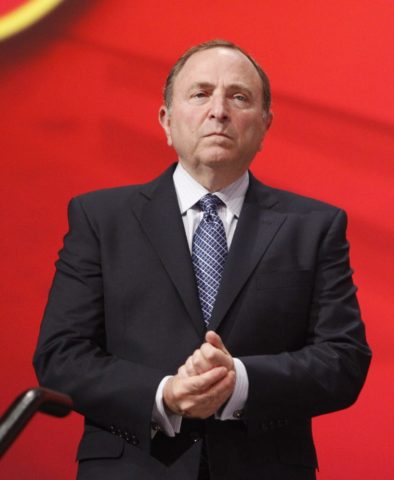
As a result, the upcoming games will be the first not to feature NHL players since the 1994 Games in Lillehammer, Norway. With that, let’s take a look back at some of the best and most memorable moments from past Winter Olympics in which NHL players were present. Keep in mind that this list won’t include classic Olympic moments like the 1980 Miracle on Ice or Peter Forsberg’s gold medal-winning shootout goal against Canada in 1994 – they took place prior to NHL participation in the Winter Olympic Games, and can’t be included in our countdown.
‘The Dominator’ Shuts Down Canada
We’ll start things off with a memory from the very first Olympic Games in which NHL players were allowed to participate – the 1998 Winter Games in Nagano, Japan. The Canadians, led by future Hall of Famers such as Wayne Gretzky, Steve Yzerman, Joe Sakic, and Patrick Roy, among others, entered the tournament as the presumptive favorites, and, through four games, had indeed managed to live up to the immense hype. They breezed through the group stage with three solid victories and easily dispatched Kazakhstan in the quarterfinals by a score of 4-1.
However, the tournament quickly came to an end for the Canadians when they ran into Dominik Hasek and the Czech Republic in the semifinals. For nearly 59 minutes, Hasek put on a goaltending clinic – he stopped every shot thrown his way, and, after Jiri Slegr scored at the halfway mark of the third period, the Czechs appeared to be headed towards a shutout victory over Canada. Trevor Linden had other ideas, though, as he put one past Hasek with just 1:02 remaining in the game to send things to overtime.
After a scoreless overtime period, the game headed to a shootout, where, on paper, the Canadians appeared to have the upper hand due to their stacked roster of NHL superstars. However, Hasek recovered nicely from Linden’s late tally and locked things down, as he stopped Theo Fleury, Ray Bourque, Joe Nieuwendyk, Eric Lindros, and Brendan Shanahan in the shootout to give the Czechs the 2-1 victory.
https://www.youtube.com/watch?v=IqTZwyOs5nQ&t=33s
Led by another outstanding performance in goal from ‘The Dominator’, the Czech Republic shut out Russia 1-0 in the ensuing gold medal game to claim their first (and, so far, only) Olympic gold medal in the sport of hockey. Canada, on the other hand, failed to medal as they went on to lose their bronze medal contest against Finland.
Many still blame Canadian head coach Marc Crawford for the loss, as he did not include Gretzky or Yzerman in his shootout lineup, but critics also forget that Canada was dealing with a prime Hasek during these Olympic Games. In Feb. 1998, when these Games took place, Hasek was, arguably, at his absolute peak as a professional – following the season, Hasek was awarded his second consecutive Hart Memorial Trophy and fourth overall Vezina Trophy, and was, at the time, considered by many to be the most dominant goaltender in the world. There’s no guarantee that Gretzky (or anyone else, for that matter) would have been able to solve Hasek had they been utilized in the shootout.
The Belarusian Miracle
Although the 1980 Miracle on Ice won’t be included here due to the fact that NHL players were not involved, another Olympic upset of a similar caliber will indeed make an appearance on our list.
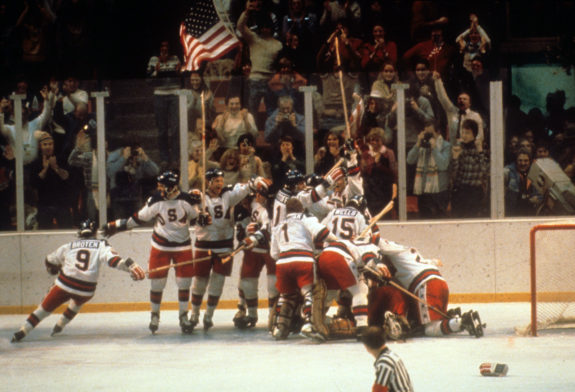
Despite the fact that they had rightfully earned a spot in the group stage of the 2002 Winter Olympics in Salt Lake City, Utah, not much was expected from the Belarusian national hockey team. Sure, they had defeated Ukraine and France in the preliminary round to earn a spot among the final eight teams, but they boasted zero NHL players on their roster and were matched up against the best players in the world.
The initial fears that the Belarusians were in over their heads immediately proved to be true, as the Russians jumped out to an early 3-1 lead and defeated Belarus in their first group stage contest by the score of 6-4. The worst was yet to come, though, as the Belarusians suffered back-to-back 8-1 losses against Finland and the United States to finish the group stage with a minus-16 goal differential in just three games.
Due to their last place finish within their group, Belarus was matched up against Sweden, the tournament’s top overall seed, in the quarterfinals. Virtually no one expected Belarus to be competitive against the Swedes, and Tre Kronor indeed appeared to be on their way to another blowout victory when Nicklas Lidstrom gave his team the lead less than four minutes into the game. However, in a stunning turn of events, the Belarusians struck for two quick goals and took a 2-1 lead with them into the locker room after 20 minutes.
Michael Nylander tied the game for Sweden during the second period, but Andrei Kovalev restored Belarus’ lead just 2:47 into the third period to put the Swedes on the brink of a monumental upset. Five minutes later, though, Mats Sundin put a shot past Belarusian goaltender Andrei Mezin to tie the game and seemingly put Sweden back in control.
What happened next, though, defied all logic – with time winding down, Belarusian defenseman Vladimir Kopat gathered the puck in the neutral zone and skated across center ice before firing a 70-foot shot in on Swedish goaltender Tommy Salo. It was an innocent looking play, but the puck hit Salo in the mask, causing him to lose track of it. Swedish defenseman Kenny Jonsson saw the puck headed towards the empty net, but he was unable to clear it in time, and the puck trickled over the goal line with just 2:24 to go in regulation. The Swedes desperately tried to score the tying goal to send the game to overtime, but they were unable to recover from Salo’s error and were eliminated from the Olympics by the score of 4-3.
After their triumph over Sweden, the Belarusians quickly came crashing back down to earth – they managed just 14 shots on goal in the semifinals against Canada as they were defeated by a 7-1 score, and were similarly dominated in the bronze medal game by Russia as they dropped a 7-2 decision.
The damage was already done, though. For Sweden, the loss prompted a wave of criticism from both Swedish media and fans alike. Salo, in particular, received the lion’s share of the blame for the loss, and many outside observers felt that he was never the same player again following the loss. Fortunately for Sweden, they would receive a chance at redemption during the 2006 Games in Turin (more on this later).
Canada Ends the Drought
After the bitter disappointment of 1998, the Canadians entered the 2002 Winter Games with a renewed focus on their ultimate goal – bringing an Olympic hockey gold medal back home to Canada for the first time since 1952. However, despite another stacked roster which again included multiple future Hall of Famers, they struggled to start the tournament – they won just once during the group stage and narrowly defeated Finland in the quarterfinals to earn a berth in the semifinals against Belarus. Canada would eventually reach the gold medal game, where they faced off against the upstart Americans.
Team USA, led by 1980 Miracle on Ice coach Herb Brooks, was not expected to contend in the tournament after a sixth-place finish in Nagano in 1998. However, Brooks was able to get the most out of his veteran roster and led them to a surprising first-place finish in Group D. From there, the Americans, led by a solid but aging core of Chris Chelios, Brian Leetch, Phil Housley, and Mike Richter, routed Germany in the quarterfinals before defeating Russia in the semifinals on the 22nd anniversary of the Miracle on Ice to reach the gold medal game.
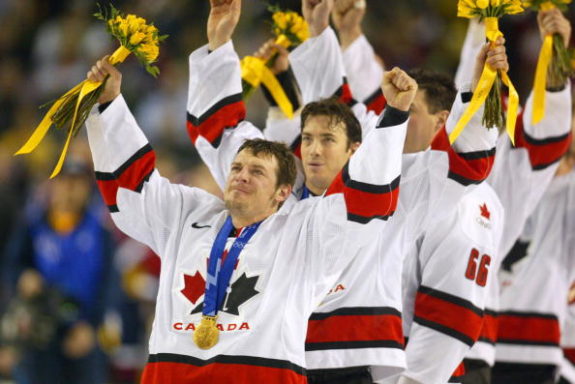
The Americans were seen as long shots to defeat Canada and win gold, but, despite the odds, they managed to hold their own during the early parts of the contest. Tony Amonte opened the scoring for the Americans just 8:49 into the first period, but Paul Kariya and Jarome Iginla struck for goals of their own later in the period to give Canada the 2-1 lead after 20 minutes.
American defenseman Brian Rafalski restored hope for Team USA with a tying goal at 15:30 of the second period, but Joe Sakic quickly extinguished these hopes with a goal less than three minutes later to give Canada a 3-2 lead heading into the third period. The Americans pushed hard for the tying goal in the final 20 minutes, but Iginla and Sakic put the game away with goals late in the period to give the Canadians the 5-2 victory and their first hockey gold medal in 50 years.
The King Wears the Crown
After winning the gold in 2002, the pressure was once again on Canada to repeat as gold medal winners at the 2006 Games in Turin, Italy. Only seven players from the victorious Salt Lake City squad returned, but those who departed were replaced by other Canadian NHLers such as Dany Heatley, Shane Doan, Vincent Lecavalier, and Brad Richards, among others. Despite the roster turnover, the Canadians were once again seen as the favorites entering the tournament.
Things started off well enough for Canada in Turin, as they opened the tournament with easy victories over both Italy and Germany. However, the Canadians then ran into some issues – they suffered back-to-back shutout losses against Switzerland and Finland but recovered to defeat the Czech Republic in their final group contest. However, in the quarterfinals against Russia, the Canadians were shut out for the third time in six games and were eliminated from medal contention as a result.
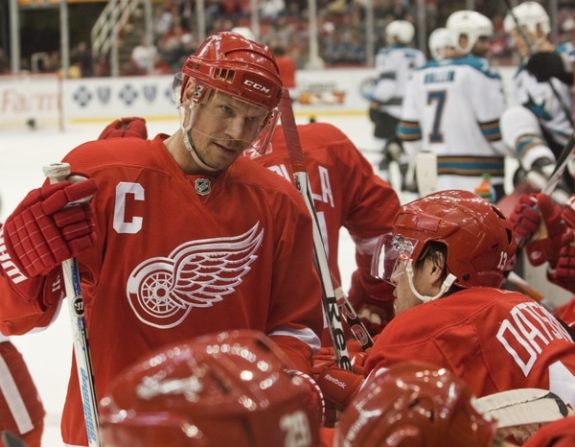
With Canada eliminated, the spotlight in Turin shifted to the Swedes. After their embarrassing loss to Belarus in 2002 (see above), the Swedes entered the 2006 tournament in top form with redemption on their minds. Led by multiple established NHL superstars in Nicklas Lidstrom, Mats Sundin, Peter Forsberg, and Henrik Zetterberg, as well as a promising 23-year-old goaltender named Henrik Lundqvist, the Swedes finished the group stage with a 3-2-0 record and earned a berth in the playoff round. They opened the knockout stage with an easy 6-2 victory over the Swiss and earned a berth in the gold medal game with a convincing 7-3 victory over the Czech Republic in the semifinals.
Waiting for the Swedes in the gold medal game was a familiar foe – Finland. The two bordering Nordic countries share a long hockey rivalry and have both sent hundreds of players to the NHL. As a result, the 2006 Olympic gold medal hockey game became, arguably, the most star-studded contest in Olympic hockey history up to that point. Finland, like Sweden, was also led by a group of NHL superstars, as their roster included talents such as Teemu Selanne, Saku Koivu, Mikko Koivu, and Teppo Numminen.
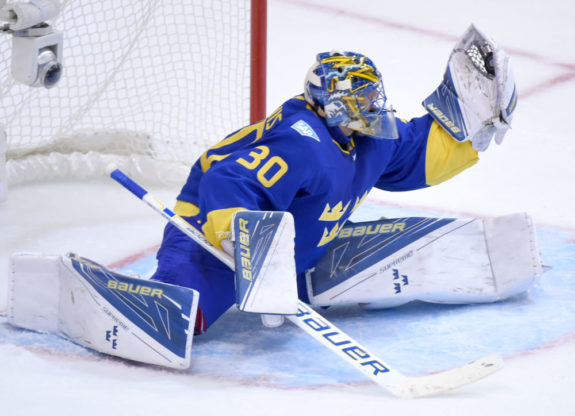
With so much talent on the ice, many expected an evenly-matched, back-and-forth game, and those who tuned in were not disappointed. After each team scored two goals apiece during the first two periods, the two hockey juggernauts entered the third and final frame deadlocked at two. However, the tie was broken quickly, as Lidstrom scored on a one-timer just 10 seconds into the third period to give Sweden the 3-2 lead. Henrik Lundqvist locked things down the rest of the way, and came up with a huge save on Olli Jokinen in the final seconds to secure his country’s second Olympic gold medal in 12 years.
Selanne Ends Olympic Career with Bronze
Entering the 2014 Winter Games in Sochi, Russia, there were many intriguing storylines that hockey fans around the world had their eyes on. One which had long appealed to many was the final Olympics of one of the greatest players of all time – Teemu Selanne. Selanne, a veteran of five previous Olympic Games, announced prior to the start of the 2013-14 NHL campaign that it would be his final one as a player, and that the 2014 Winter Olympics would be his final international appearance for his home country of Finland.
Hopes were high that Selanne would finish his international career on a high note, but, after he entered the Olympic break with just seven goals in 47 games, many were left wondering just how effective the 43-year-old would be against the world’s best. However, Selanne turned back the clock and turned in a vintage performance for Finland in Sochi. He recorded a goal and an assist in the group stage and helped his country clinch an automatic bye into the knockout round by virtue of their 2-0-1 record in Group B.
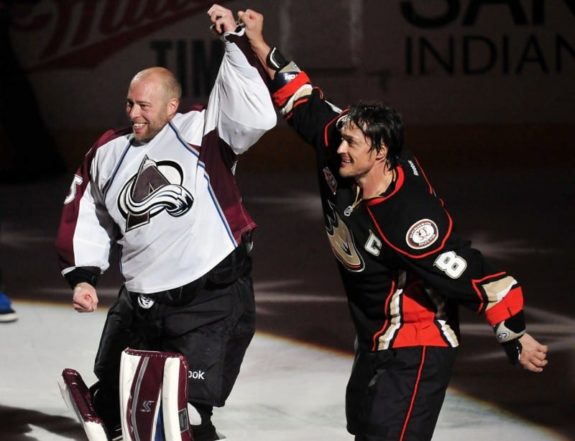
In their first knockout-stage contest in Sochi, Finland took the ice against the host team – Russia. The Russians, needing a victory to avoid being eliminated from medal contention in front of the home crowd, struck first with a goal at 7:51 of the first period. However, their lead lasted less than two minutes, as Juhamatti Aaltonen tied the game at 9:18 with the first goal of his Olympic career. Following Aaltonen’s tally, a familiar face struck for Finland, as Selanne gave his country their first lead of the game when he beat Semyon Varlamov at 17:38 to make the score 2-1. ‘The Finnish Flash’ wasn’t done there, though, as he picked up the primary assist on Mikael Granlund’s tally at 5:37 of the second period. Granlund’s goal was the one that effectively put the game out of reach for Finland, as they cruised the rest of the way and eliminated the Russians in a 3-1 triumph.
In the semifinals, Finland once again faced off against their longtime Swedish rivals. The Finns were able to open the scoring during the second period, but the Swedes answered back with two goals of their own and went on to clinch a berth in the gold medal game with a 2-1 victory. Although they were eliminated from gold medal contention with their loss, Selanne and Finland still had one more game to play – a contest against the United States with a bronze medal on the line.
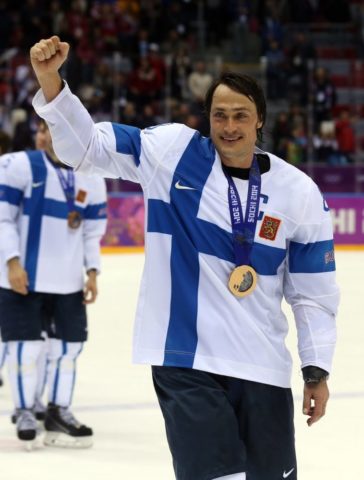
The Americans had suffered a demoralizing 1-0 shutout loss to Canada a day earlier, and Selanne quickly added to the Americans’ suffering as he opened the scoring less than two minutes into the second period with his 23rd career Olympic goal. After goals from Jussi Jokinen and Juuso Hietanen, Selanne struck again in the third period, when he beat Jonathan Quick on the power play to give Finland a commanding 4-0 lead over Team USA. Finland went on to defeat the Americans, 5-0, giving Selanne a bronze medal victory in his final game in a Finnish uniform.
With his bronze medal victory in Sochi, Selanne took home his fourth career Olympic medal and, at 43, became the oldest hockey player to ever win a medal in the Olympics. In addition, the Finnish Flash added six more points to his Olympic total and ended his international career as the all-time leader in points at the Winter Olympic Games with 43. It was a fitting end for one of the greatest hockey players of all time.
Oshie vs. Bobrovsky
Although Team USA failed to earn a medal during the 2014 Winter Olympics in Sochi, they did manage to provide one of the more memorable Olympic hockey moments in history, as they dealt a fatal blow to the advancement hopes of the host team in one of the most exciting shootouts in recent memory.
After a back and forth contest in which the Americans nearly were defeated in regulation (a potential Russian game-winning goal was nullified due to the net being slightly off of its moorings), the two teams headed to a shootout. After Oshie and Ilya Kovalchuk traded goals during the first three rounds of the shootout, the skills contest headed to sudden death, where, due to Olympic rules, a unique scenario began to play out.
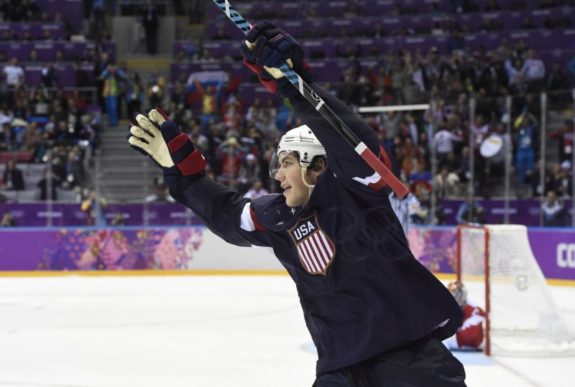
In the NHL, teams must utilize their entire roster (normally 18 skaters, barring injuries) before having a player take a second shootout attempt. However, under Olympic rules, teams can use any player they choose during sudden death, regardless of whether or not they’ve already taken a shot on net. As a result, Team USA elected to send T.J. Oshie out for the entirety of sudden death, while Russia chose to alternate between Kovalchuk and ‘the Magic Man’, Pavel Datsyuk.
Time after time, with the game on the line, Oshie was sent out to challenge Russian netminder Sergei Bobrovsky. And, time after time, either Oshie or Bobrovsky came through to keep the game alive. This lasted until the eighth round – after Kovalchuk was stopped by American goaltender Jonathan Quick, Oshie skated in and scored a beauty of a five-hole goal on Bobrovsky to stun the pro-Russian crowd and give the Americans a pivotal 3-2 victory in Sochi.
As a result of their loss, the Russians finished second in Group A and were faced with the prospect of winning two games in as many days in order to reach the medal round. They easily defeated Norway in the first half of the back-to-back on Feb. 18 but ran into trouble against Tuukka Rask and the Finns on Feb. 19. Despite firing 38 shots at the Finnish netminder, the Russians beat Rask only once and were eliminated from the Olympics on home ice by a 3-1 score.
Price Carries Canada
Oshie may have stolen the show against Russia, but there’s no doubt that Team Canada goaltender Carey Price turned in the best individual performance of the 2014 Winter Olympics. During the group stage, Price was nearly flawless – he allowed just a single goal against both Finland and Norway (Roberto Luongo shut out Austria in Canada’s other group stage contest) and helped Canada finish first in their group with a perfect 3-0 record.
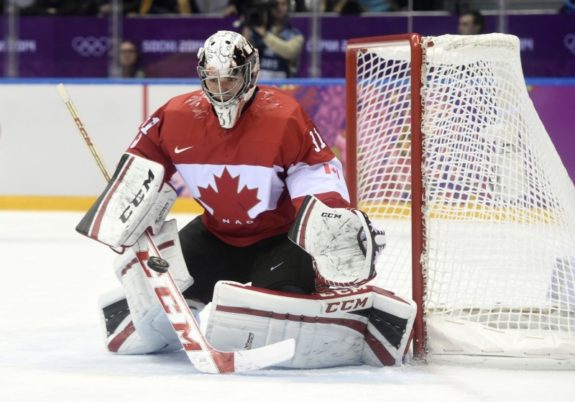
As good as he was in the group stage, Price was even better in the knockout stage. The Canadians opened the playoff round against the Latvians and were expected to easily handle their opponent, as they had played the day before and featured exactly one NHL player on their roster. Indeed, the Canadians struck quickly as Patrick Sharp scored at 13:37 to give Canada the early 1-0 lead. However, Latvia answered with a goal of their own, as Lauris Darzins scored just over two minutes later to tie the game at one goal apiece.
What happened next will likely be remembered as one of the best Olympic goaltending performances of all time – Latvian goaltender Kristers Gudlevskis was bombarded with nearly 60 shots over the course of the game, but he stood on his head and stymied a potent Canadian offensive attack for most of the contest. With his counterpart playing the game of his life, the pressure was on Price to keep the score tied until Canada could solve Gudlevskis. He did just that, as he stopped every shot thrown his way until Shea Weber finally got a power play goal past Gudlevskis late in the third period to give Canada a hard-fought 2-1 victory.
In the semifinals, the Canadians met Team USA in a much-anticipated rematch of 2010’s gold medal game (more on this later). The Americans, like the Canadians, also entered the game undefeated and had reached the semifinals on the strength of their offense, which had produced 20 goals in their four previous contests in Sochi. However, Price quickly put a stop to the Americans’ offensive attack, as he stopped all 31 shots he faced and led Canada to another gold medal game appearance with a shutout victory.
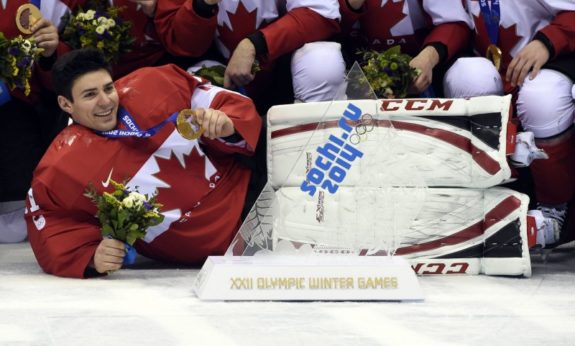
In the gold medal game, the Canadians took on Sweden in what was seen by many as a matchup between the two best teams in the Olympics. Both teams were undefeated in Sochi, and both teams had rosters that were loaded with high-end NHL talent. However, it would be the Canadians that emerged victorious – Price won the gold medal for Canada with his second consecutive Olympic shutout.
Price’s final statistics in Sochi were nothing short of spectacular – he started five games and allowed just three goals on 106 shots (0.59 GAA, .972 SV%) while leading Team Canada to their second consecutive gold medal victory. His back-to-back shutouts in the medal round against the United States and Sweden will be remembered as one of the greatest Canadian international hockey performances in history.
The Golden Goal
We’ll wrap things up with arguably the greatest Canadian Olympic hockey moment of all time – Sidney Crosby’s Golden Goal.
The year is 2010. Canada is hosting the Winter Olympic Games for the first time since 1988. After failing to advance past the quarterfinals in 2006, Hockey Canada is under immense pressure to come through with a gold medal victory on home ice in Vancouver.
Despite the expectations, things got off to a rocky start for the Canadians – although they won their first two group stage contests against Norway and Switzerland, they dropped a 5-3 decision against the United States in their final group contest to fall into a spot in the qualification playoffs. The Canadians needed to win three games in four days in order to reach the gold medal game, and were able to do so with victories over Germany, Russia, and Slovakia. Standing in their way of a gold medal was a familiar foe – the United States.
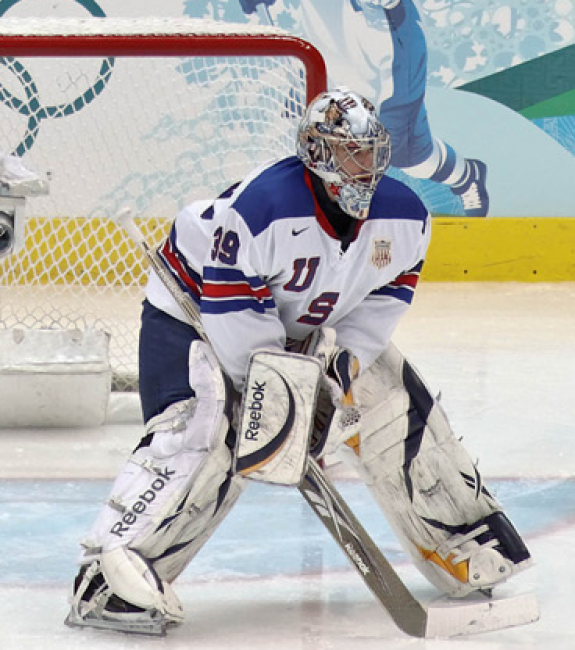
Led by an unbelievable performance in goal from Ryan Miller, the Americans reached the gold medal game with a perfect 5-0-0 record and had allowed just six goals in their previous five contests in Vancouver. However, the Canadians jumped all over Miller early, as Jonathan Toews opened the scoring at 12:50 in the first period to give Canada a 1-0 lead after 20 minutes. Corey Perry doubled Canada’s lead 7:13 into the second period, but Ryan Kesler cut the lead in half with a goal of his own at 12:44.
Canada carried a one-goal lead into the third period and appeared to be on their way toward a regulation victory until American forward Zach Parise beat Roberto Luongo with just 24 seconds remaining in the game. After Parise’s tally, the game headed to overtime, where Sidney Crosby provided the heroics 7:40 into the extra frame:
Crosby made Canada’s dream scenario become a reality, as his gold medal-clinching goal against the Americans in overtime sent the home crowd at Rogers Arena into a frenzy. There’s no doubt that Crosby’s Golden Goal is the greatest NHL-era Olympic moment of all time.
Olympic Hockey Remains Must-See TV
Although NHL players won’t be participating in the 2018 Winter Olympics in Pyeongchang, there are still plenty of reasons for fans around the world to tune in to hockey’s greatest international showcase. With no NHL players to choose from, nations were sent scrambling – they had to search far-and-wide for players who were both skilled and eligible to compete. As a result, most countries’ rosters were filled out largely with former NHLers or players who had made their name overseas.
Despite the lack of NHL players, there will be tons of storylines – the return of college players to Team USA, the presence of 17-year-old Rasmus Dahlin (the presumptive number-one pick in this summer’s draft) on Team Sweden, and a loaded Team Russia (excuse me, Olympic Athletes from Russia), which is filled with players from the Kontinental Hockey League (KHL), which, unlike the NHL, will be allowing its players to participate in the Games. With former NHLers like Kovalchuk, Datsyuk, and Slava Voynov on the team, the Russians appear to be huge favorites to win gold in South Korea.
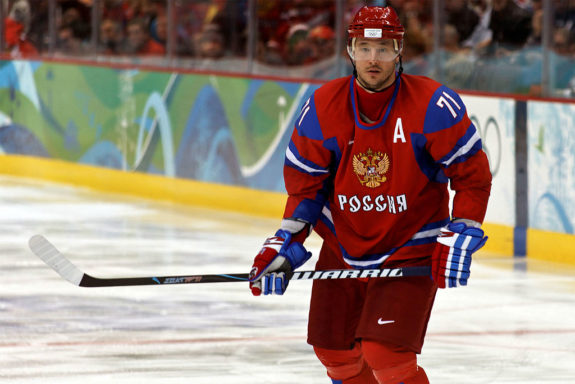
However, a loaded roster doesn’t always equal success in the Olympics. Overconfidence can easily lead to underperformance on the world’s biggest stage. There are countless historical examples of underdog teams overcoming the odds and defeating the favorite, and it’s likely that there will be many more such occurrences in the future. Could we see another ‘Miracle on Ice’ in 2018? Only time will tell, but all the ingredients for one to occur are in place.
2018 Winter Olympics roster previews
Men’s: Canada | United States | Russia | Czech Republic | Sweden | Finland | Switzerland | Slovakia | Germany | Slovenia | South Korea
Women’s: Canada | United States | Russia | Finland | Sweden | Switzerland | South Korea | Japan